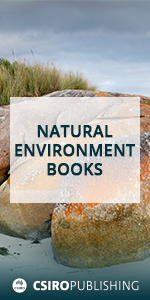
Pacific Conservation Biology
Volume 24 Number 2 2018
PC17045An adaptive management case study for managing macropods on Maria Island National Park, Tasmania, Australia: adding devils to the detail
Three macropod species have been culled annually on Maria Island, Tasmania, Australia, in an effort to improve animal welfare by reducing grazing pressure. An adaptive management approach has resulted in greater stakeholder involvement and informed decision making. Impacts from Tasmanian devils recently introduced to Maria Island are as yet unknown.
PC17035Avian nest predation in Australian temperate forest and woodland: a review
Forest and woodland birds are threatened by landscape modifications. This review discusses the main issues in nest predation research in Australia: mesopredators, the use of artificial nests, ‘edge-effects’, the identification and role of nest predators and the responses of their prey. Future research should focus on natural nests to provide direct information on practical interventions and generate broad assemblage-wide theories to better inform conservation.
PC17051Is camera trap videography suitable for assessing activity patterns in eastern grey kangaroos?
Camera traps were used to study eastern grey kangaroo behaviour. Findings compared with published data revealed that activity patterns were largely consistent with other methods although nocturnal behaviour was underrepresented. Unusual fighting behaviour was observed. Kangaroos became habituated to cameras after eight months.
PC17037An examination of funding for terrestrial vertebrate fauna research from Australian federal government sources
This study investigated publically available data to determine the scale and spread of wildlife projects supported for the period 2005–15 by Australian Federal Government agencies responsible for research, environmental management and innovation. We conclude that greater investment is needed if innovation in wildlife conservation and management is to have a solid evidence base.
PC18003What can we learn from untapped wildlife rescue databases? The masked lapwing as a case study
Few studies have utilised data arising from wildlife rescues and surveys by citizen scientists, leaving a wealth of largely untapped information. The masked lapwing, a common Australian shorebird, illustrates how such research can enhance knowledge, and inform management and conservation of threatened species.
PC18006Quantifying extinction risk and forecasting the number of impending Australian bird and mammal extinctions
To reduce the incidence of extinction we must first identify which species are at greatest risk. We use a combination of existing global processes (IUCN and NatureServe) and expert elicitation to forecast which, and how many Australian birds and mammals are likely to be lost by 2038 unless management improves.
PC18006 Abstract | PC18006 Full Text | PC18006PDF (369 KB) | PC18006Supplementary Material (101 KB) Open Access Article
PC17053A collaboratively derived environmental research agenda for Galápagos
A participatory approach – which included decision-makers, managers, scientists and civil society – that led to the definition of the 50 priority research questions for the Galapagos Islands. The proposed research agenda includes themes such as tourism, development, planning, education, agriculture, hydrology, invasive species, marine and conservation.
PC17053 Abstract | PC17053 Full Text | PC17053PDF (332 KB) | PC17053Corrigendum (332 KB) Open Access Article
PC18007Aestivation dynamics of bogong moths (Agrotis infusa) in the Australian Alps and predation by wild pigs (Sus scrofa)
Bogong moths migrating to the alpine regions of south-eastern Australia are now having to cope with not only a warming climate, but also introduced predators. Camera surveillance reveals wild pigs are habitually moving to the high country over summer and preying on aestivating bogong moths accessible to them. The significance of this predation on moth abundance is unclear.
PC18007 Abstract | PC18007 Full Text | PC18007PDF (400 KB) Open Access Article
PC18027Differences in abundance and diversity of diurnal invertebrates among three Fijian forests, and a comparison of two trapping methods for rapid assessments
Fijian invertebrates receive little research attention. We compared abundance and diversity of diurnal terrestrial invertebrates within three forests, and evaluated the efficiency of Malaise traps and beating trays. Invertebrates differed among sites; we identify orders with high sampling reliability and recommendations for rapid biodiversity assessments in poorly-studied areas.
PC17041Declining spring usage of core habitat by endangered fish-eating killer whales reflects decreased availability of their primary prey
An endangered killer whale population in the Salish Sea of Washington State, USA and British Columbia, Canada has shifted their seasonal range in response to declines of their Chinook salmon prey, providing evidence for the need to revise critical habitat designations in both countries.
PC17044Clever girl? An observation of innovative prey handling by a dingo (Canis dingo)
This research note documents an observation of a dingo (Canis dingo) utilising the surf on the eastern beach of K’gari (Fraser Island) to entrap, tire and deliberately drown an adult swamp wallaby (Wallabia bicolor). Is this a clever hunting adaptation to reduce the energetic costs of pursuing and larger killing prey?
PC18001Strengthening participatory approaches to coastal fisheries governance in Papua New Guinea: the role of local-level government legislation
In seeking to strengthen community-based and participatory approaches to fisheries management in the nation, this paper will highlight the significant role of local-level governments in re-envisioning coastal and small-scale fisheries governance and argues that such local-level legislative authorities provide an opportunity to progress the nation’s coastal fisheries governance.
PC18015The longest-lived spider: mygalomorphs dig deep, and persevere
We document the world’s oldest known spider, and outline the methods and biology relevant to this discovery. Regular monitoring enabled us to record the death of a 43-year-old Gaius villosus mygalomorph spider in a small, native, remnant reserve in the otherwise substantially cleared agricultural landscape of south-western Australia.
PC17053_COCorrigendum to: A collaboratively derived environmental research agenda for Galápagos
PC17053_CO Abstract | PC17053_COCorrigendum (332 KB) Open Access Article



